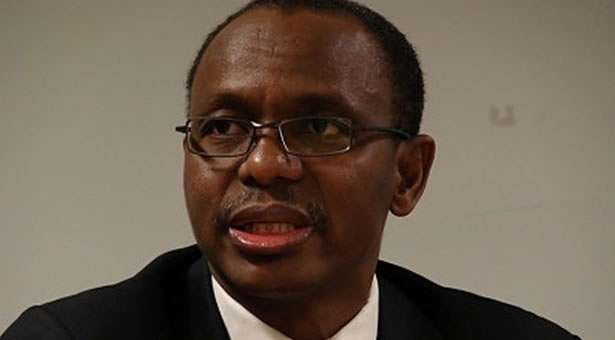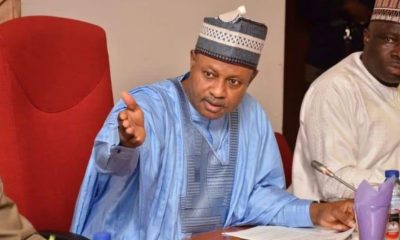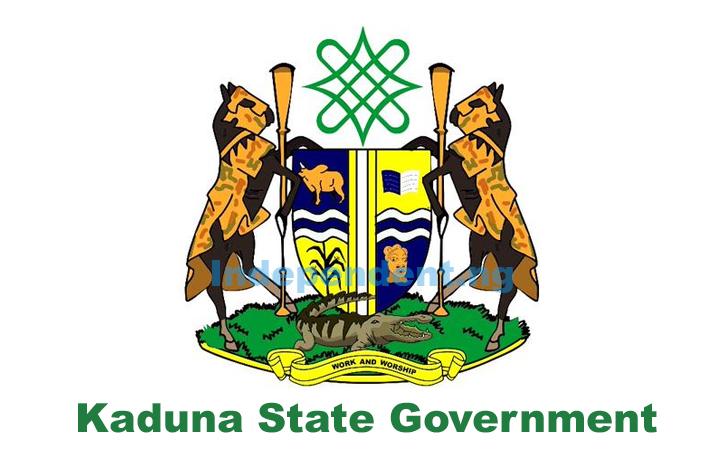Exclusive
The religious bill in Kaduna State
Published
8 years agoon
By
Olu Emmanuel
THE brilliant Governor of Kaduna State, Nasir Ahmad el-Rufai, has introduced an executive Bill with the long title of “A BILL TO SUBSTITUTE THE KADUNA STATE RELIGIOUS PREACHING LAW of 1984”, which, when passed into Law by the Executive-controlled Kaduna State House of Assembly, will enable the State Government to regulate, monitor, supervise, handle, take the helm of, oversee and control all religious activities (Christian or Muslim) in Kaduna State. I dare say that the introduction of this Bill belies the acclaimed intelligence of the Governor.
The proposed Law will foist draconian sanctions on anyone (or group of people) who runs afoul of it: all religious services, including revival or church services and, presumably, the salat al-jumah(Muslims’ Friday prayers, which are always conducted on open grounds), must be conducted inside, not outside, church buildings or mosques, and any “sponsored preacher” (Nigerian or foreigner) from outside Kaduna State, must obtain a permit whose validity terminates at the end of the event for which it was issued. Section 42 (1) of the 1999 Constitution (as amended) warns that:
“A citizen of Nigeria of a particular community, ethnic group, and place of origin, sex, religion or political opinion shall not, by reason only that he is such a person
(a) be subjected either expressly by, or in the practical application of, any law in force in Nigeria or any executive or administrative action of the government, to disabilities or restrictions to which citizens of Nigeria of other communities, ethnic groups, places of origin, sex, religious or political opinions are not made subject;…”
Courts, the world over, particularly in the US, have frowned on laws that appear to restrict freedom of expression, especially those that impose restraint prior to publication, including, for example, licensing schemes that require permission before a lecture can be delivered. A prior restraint on expression comes to Court with a heavy presumption against its unconstitutionality. (See Twentieth Century Music Corp. vs. Aiken 1975) H.S.).
Under the prospective Law in Kaduna State, every church or mosque, established or to be established, shall obtain a licence, renewable annually, from a committee to be established in each of the numerous Local Government Areas in the State. Each committee shall comprise “a Chairman, a Police Officer, not below the rank of an Assistant Superintendent, two Muslims, one each representing the Izala and Darika religious groups, two representatives of the Christian Association of Nigeria and a representative of the traditional institution”. All these committees shall make recommendations to the Ministerial Committee, which, in turn, shall recommend “good” applications for the establishment or sustenance of a church or mosque, to the Governor for approval.
ALSO SEE: El-Rufai’s preaching regulation bill suffers serious attacks
This Bill seeks to make all religious bodies trudge through the labyrinth of the harrowing political and security apparatchiks, including, but not limited to, the Ministry of Justice, the Police, the dreaded Department of State Security (DSS), the Civil Defence Corps and the Secretary to the State Governmentall of whom must work under the “Relevant Authority”, defined as “the Jama’atu Nasril Islam (JNI), the Christian Association of Nigeria (CAN) and a Ministerial Committee”, which is answerable directly to the Governor of Kaduna State.
This poorly-drafted Bill, with otiose and inelegant phraseology, then adds, “All cassettes, CDs, flash drives or any other communication gadgets containing religious recordings from accredited preachers may be played in the following places only: (a) inside ones house (b) inside entrance porche (Zaure) (c) inside the church (d) inside the mosque (e) any other designated place of worship…”
The penalties for violators of this proposed Law on religious activities are puritanical: “Any person shall be guilty of an offence who, in contravention of this Law, (a) preaches without a valid licence (b) plays religious cassettes or uses a loud speaker for religious purposes after 8 pm in a public place (c) uses a loudspeaker for religious purposes other than inside a mosque or church…shall be liable on conviction to a term of imprisonment not exceeding two years or a fine of N200,000 or both and have his licence revoked…” The Shariah and Customary Courts, vested with jurisdiction to try the violators of this prospective Law, can order the “destruction of vehicle, equipment, instrument, gadget or book (including the Bible and the Quran?) or other material carrying any offensive message.”
The proposed Law is, mutatis mutandis, a replica of The Kaduna State Regulation of Religious Preaching Edict No. 7 of 1984, an ill-advised military Law, put in place by the then military Governor of Kaduna State, an Air Vice-Marshal, who headed an arm of the anti-people military regime that set aside section 39 of the 1979 Constitution, which was in pari materia with section 38 of the 1999 Constitution (infra).
It is needless to state that this Bill, the Religious Preaching Bill, is as strange and grotesque in its unconstitutional contents and as offensive and horrid in its conception and intention, as it is, contrary to what Mr. Barnabas Bala, the Kaduna State Deputy Governor, may have said (with a chicken heart), a direct affront on the 1999 Constitution, the only document, not the amalgamation of 1914 (with doubtful legality), that binds us together today! The Supreme Court of Nigeria once stated with aplomb and information that “Law does not exist in vacuo. The Constitution exists for Nigerians who are just having an experiment in democracy. A constitution is not an academic document meant for abstract consideration. It is a revelation of the Social Contract made by the people of a particular nation for those people with full realization of the peculiar background of the people.” (Per Kayode Eso, JSC (as he then was) in Fawehinmi vs. Akilu (1987) 4 NWLR (Pt. 67) 797 @848. El-Rufai should realize that Nigeria comprises a disparate congeries of ethnic nationalities, with plural cultures, including religious persuasions.
ALSO SEE: Buhari: A season of confusion over Islamisation of Nigeria
That the said Bill is aimed at the growth or spread of Christianity cannot be gainsaid, the mention of Jama’atu Nasril Islam and mosques in it, notwithstanding. In order words, the inclusion of those names JNI and mosquesare a mere fig leaf, a veneer, to cover the real intention of the Bill, designed, doubtless, to stop the growth of Christianity. Or how can Governor el-Rufai seriously intend to stop Moslems from observing their salat al-jumah (jumat prayers) in “public places” every Friday?
It should be clear to the draftsmen of this Religious Preaching Bill that its 1984 counterpart, the Kaduna State Religious Preaching Edict No. 7, pre-dated the current Constitution of the Federal Republic of Nigeria 1999 (as amended), which, in its section 38 (1) provides, for good measure, inter alia, as follows:
“(1) Every person shall be entitled to freedom of thought, conscience and religion, including freedom to change his religion or belief, and freedom (either alone or in community with others, and in PUBLIC or in PRIVATE) to MANIFEST AND PROPAGATE HIS RELIGION OR BELIEF IN WORSHIP, TEACHING, PRACTICE AND OBSERVANCE” (emphasis added).
The foregoing provisions of this section put an accent on freedom of worship anywhere in Nigeria; they do not restrict anybody to an individual’s house or to any particular corner of a town or State. And section 1 (1) of the 1999 Constitution provides that “This Constitution is supreme and its provisions shall have binding force on all authorities and persons throughout the Federal Republic of Nigeria.” Subsection (3) thereof further provides that “If any other law is inconsistent with the provisions of this Constitution, this Constitution shall prevail, and that other law shall, to the extent of the inconsistency, be void.”
The motto of Nigeria, in terms of section 15 (1) of the 1999 Constitution, is Faith, Peace and Progress. Ipso facto, subsection (2) thereof orders that “…national integration shall be actively encouraged, whilst discrimination on the grounds of place of origin, sex, religion, status, ethnic or linguistic association or ties shall be prohibited.” That being so, for a State Law to require a Nigerian from another State of Nigeria to obtain a permit before he/she can preach in a church/mosque in Kaduna State, is not only an arrant violation of the relevant provisions of the Constitution but a flagrant breach of his/her fundamental human rights. The point should also be made that it would be ultra vires the Kaduna State House of Assembly to enact a Law requiring a Nigerian who wishes to “manifest and propagate his religion or belief in worship, teaching, practice and observance” in Kaduna State to obtain a licence, renewable every year, for him/her to establish or sustain a place of worship.
In all egalitarian and democratic societies, the separation of state and religion is the beginning of wisdom. The cornerstone of the American notion of separation of church and state and the guarantee of free exercise of religion, for example, is encapsulated in the very first Amendment of the 1787 Constitution of the United States of America in 1791. According to the said First Amendment,
“Congress shall make no law respecting an establishment of religion, or prohibiting the free exercise thereof, or abridging the freedom of speech, or of the press; or the right of the people peaceably to assemble, and to petition the Government for a redress of grievances.”
The free exercise of religion is the very anchor-sheet of civil liberty and any attempt to abrogate that freedom will equate with the Nigerian aphorism, “trouble dey sleep, yanga come wake am”! When the Kaduna State Government begins to enforce the unconstitutional Law, with all is asperities, it may create, in the North-West, a situation that is akin to the internecine war in the North-East!
Verbum sat sapienti est!
You may like


Fatal Crash on Zaria-Kano Expressway Leaves 12 dead, 28 injured


Gov Sani orders state University to stop collection of levy


Kaduna State Govt launches sex offenders database


Kaduna State Govt spends N158.1bn on education in 5 years


Kaduna State Govt distributes uniforms, learning materials to 4,260 primary schools, others


El-Rufai fixes date for payment of new minimum wage
Trending

 Football6 days ago
Football6 days agoGuardiola advised to take further action against De Bruyne and Haaland after both players ‘abandoned’ crucial game

 Health & Fitness12 hours ago
Health & Fitness12 hours agoMalaria Vaccines in Africa: Pastor Chris Oyakhilome and the BBC Attack

 Aviation1 week ago
Aviation1 week agoDubai international airport cancels flights as flood ravages runway, UAE

 Featured4 days ago
Featured4 days agoPolice reportedly detain Yahaya Bello’s ADC, other security details

 Comments and Issues6 days ago
Comments and Issues6 days agoNigeria’s Dropping Oil Production and the Return of Subsidy

 Education5 days ago
Education5 days agoEducation Commissioner monitors ongoing 2024 JAMB UTME in Oyo

 Business5 days ago
Business5 days agoMaida, university dons hail Ibietan’s book on cyber politics

 Education1 week ago
Education1 week agoOsun NSCDC solicits cooperation towards national assets protection

